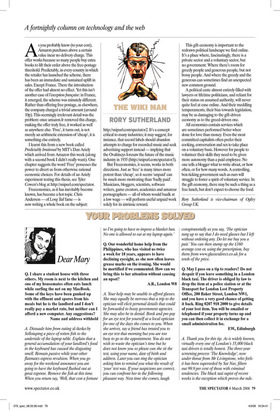A fortnightly column on technology and the web
As you probably know (to your cost), Amazon purchases above a certain value incur no delivery charge. This offer works because so many people buy extra books to lift their order above the free-postage threshold. Predictably, in every country in which the retailer has launched the scheme, there has been an immediate and sustained uplift in sales. Except France. There the introduction of the offer had almost no effect. Yet this isn’t another case of l’exception française: in France, it emerged, the scheme was minutely different. Rather than offering free postage, as elsewhere, the company charged a trivial amount (around 10p). This seemingly irrelevant detail was the problem: once amazon.fr removed this charge, making the offer truly free, it worked as well as anywhere else. ‘Free’, it turns out, is not merely an arithmetic extension of ‘cheap’, it is something else entirely.
I learnt this from a new book called Predictably Irrational by MIT’s Dan Ariely which arrived from Amazon this week (along with a second book I didn’t really want). One chapter suggests the word ‘Free’ possesses the power to divert us from otherwise rational economic choices. For details of an Ariely experiment testing this thesis, see Tyler Cowen’s blog at http://snipurl.com/spectator.
Freeconomics, as it has inevitably become known, has become a hot topic. Chris Anderson — of Long Tail fame — is now writing a whole book on the subject: http://snipurl.com/spectator2. It’s a concept critical to many industries; it may suggest, for instance, that record labels should abandon attempts to charge for recorded music and seek advertising support instead — implying that the Ovaltineys foresaw the future of the music industry in 1935 (http://snipurl.com/spectator3).
But Freeconomics, it seems, works in both directions. Just as ‘free’ is many times more potent than ‘cheap’, so it seems ‘unpaid’ can be much more motivating than ‘badly paid’. Musicians, bloggers, scientists, software writers, game creators, academics and amateur pornographers — all of whom would baulk at a low wage — will perform useful unpaid work solely for its intrinsic reward. This gift-economy is important to the redrawn political landscape we find online. It’s a place where, fascinatingly, there is a private sector and a voluntary sector, but no government. Where there’s room for greedy people and generous people, but not bossy people. And where the greedy and the generous can sometimes find an unexpected new common ground.
A political caste almost entirely filled with lawyers or lifetime politicians, and reliant for their status on assumed authority, will never quite feel at ease online. And their meddling temperaments, their bias towards legislation, may be as damaging to the gift-driven economy as to the greed-driven one.
All economies contain services which are sometimes performed better when done for love than money. Even the most committed capitalists often prefer their cooking, conversation and sex to take place on a voluntary basis. However for people to volunteer their skills they need to be given more autonomy than a paid employee. No one tells a blogger what to write about, or how often, or for how many words. A controlling, box-ticking government such as ours will struggle to foster a spirit of voluntary service. In the gift economy, there may be such a thing as a free lunch, but don’t expect to choose the food.
Rory Sutherland is vice-chairman of Ogilvy Group UK.


















































































 Previous page
Previous page